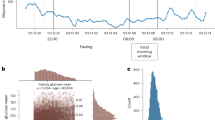Abstract
Objectives: Despite increasing interest in the concept of calibration in dietary surveys, there is still little experience in the use and standardization of a common reference dietary method, especially in international studies. In this paper, we present the general theoretical framework and the approaches developed to standardize the computer-assisted 24 h diet recall method (EPIC-SOFT) used to collect about 37 000 24-h dietary recall measurements (24-HDR) from the 10 countries participating in the European Prospective Investigation into Cancer and Nutrition (EPIC). In addition, an analysis of variance was performed to examine the level of standardization of EPIC-SOFT across the 90 interviewers involved in the study.
Methods: The analysis of variance used a random effects model in which mean energy intake per interviewer was used as the dependent variable, while age, body mass index (BMI), energy requirement, week day, season, special diet, special day, physical activity and the EPIC-SOFT version were used as independent variables. The analysis was performed separately for men and women.
Results: The results show no statistical difference between interviewers in all countries for men and five out of eight countries for women, after adjustment for physical activity and the EPIC-SOFT program version used, and the exclusion of one interviewer in Germany (for men), and one in Denmark (for women). These results showed an interviewer effect in certain countries and a significant difference between gender, suggesting an underlying respondent’s effect due to the higher under-reporting among women that was consistently observed in EPIC. However, the actual difference between interviewer and country mean energy intakes is about 10%. Furthermore, no statistical differences in mean energy intakes were observed across centres from the same country, except in Italy and Germany for men, and France and Spain for women, where the populations were recruited from areas scattered throughout the countries.
Conclusion: Despite these encouraging results and the efforts to standardize the 24-HDR interview method, conscious or unconscious behaviour of respondents and/or interviewer bias cannot be prevented entirely. Further evaluation of the reliability of EPIC-SOFT measurements will be conducted through validation against independent biological markers (nitrogen, potassium).
European Journal of Clinical Nutrition (2000) 54, 900–917
This is a preview of subscription content, access via your institution
Access options
Subscribe to this journal
Receive 12 print issues and online access
$259.00 per year
only $21.58 per issue
Buy this article
- Purchase on Springer Link
- Instant access to full article PDF
Prices may be subject to local taxes which are calculated during checkout
Similar content being viewed by others
Author information
Authors and Affiliations
Contributions
Guarantor: N Slimani.
Contributors: ER initiated the EPIC study. NS initiated the general concept and design of EPIC-SOFT and coordinated the international calibration study. MB and WvS provided advice on dietary assessment methods and PF on statistics. The other authors were responsible for the field work and data collection and participated in the development of the EPIC-SOFT programme and country-specific versions.
Corresponding author
Rights and permissions
About this article
Cite this article
Slimani, N., Ferrari, P., Ocké, M. et al. Standardization of the 24-hour diet recall calibration method used in the European Prospective Investigation into Cancer and Nutrition (EPIC): general concepts and preliminary results. Eur J Clin Nutr 54, 900–917 (2000). https://doi.org/10.1038/sj.ejcn.1601107
Received:
Accepted:
Published:
Issue Date:
DOI: https://doi.org/10.1038/sj.ejcn.1601107
Keywords
This article is cited by
-
Dietary amino acids and risk of stroke subtypes: a prospective analysis of 356,000 participants in seven European countries
European Journal of Nutrition (2024)
-
Adherence to the EAT-Lancet diet is associated with a lower risk of type 2 diabetes: the Danish Diet, Cancer and Health cohort
European Journal of Nutrition (2023)
-
Clusters of lifestyle behaviours and their associations with socio-demographic characteristics in Dutch toddlers
European Journal of Nutrition (2023)
-
Ultra-processed foods, adiposity and risk of head and neck cancer and oesophageal adenocarcinoma in the European Prospective Investigation into Cancer and Nutrition study: a mediation analysis
European Journal of Nutrition (2023)
-
Evaluation of foods, drinks and diets in the Netherlands according to the degree of processing for nutritional quality, environmental impact and food costs
BMC Public Health (2022)



